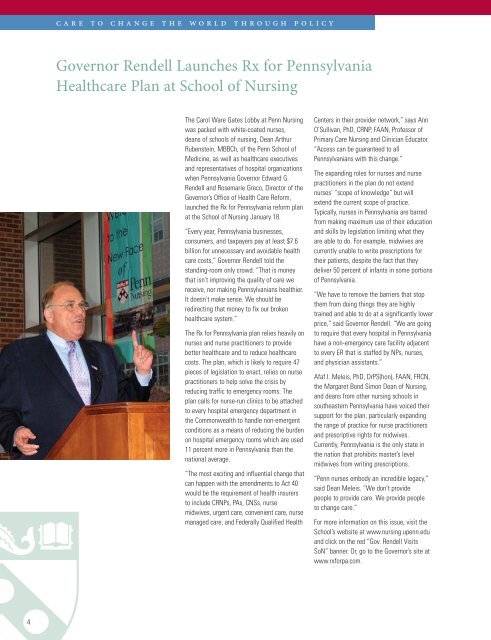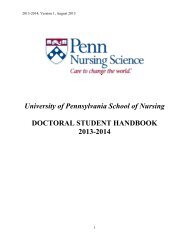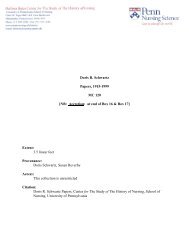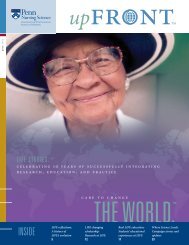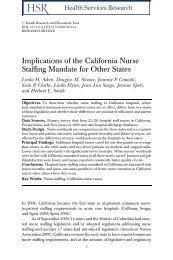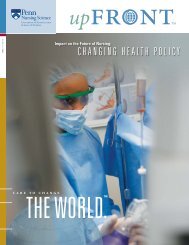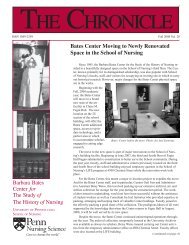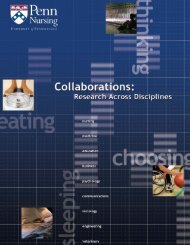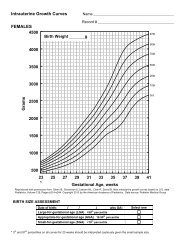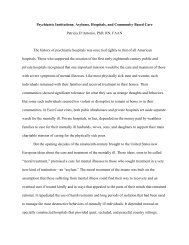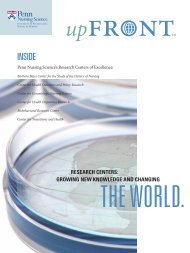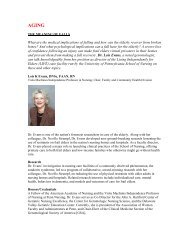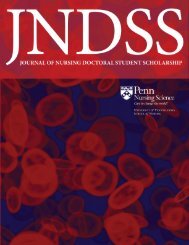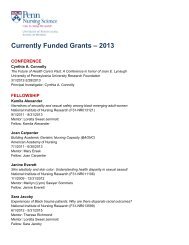upFRONT spring 07.FINAL.rev - University of Pennsylvania School ...
upFRONT spring 07.FINAL.rev - University of Pennsylvania School ...
upFRONT spring 07.FINAL.rev - University of Pennsylvania School ...
Create successful ePaper yourself
Turn your PDF publications into a flip-book with our unique Google optimized e-Paper software.
care to change the world through policy<br />
Governor Rendell Launches Rx for <strong>Pennsylvania</strong><br />
Healthcare Plan at <strong>School</strong> <strong>of</strong> Nursing<br />
The Carol Ware Gates Lobby at Penn Nursing<br />
was packed with white-coated nurses,<br />
deans <strong>of</strong> schools <strong>of</strong> nursing, Dean Arthur<br />
Rubenstein, MBBCh, <strong>of</strong> the Penn <strong>School</strong> <strong>of</strong><br />
Medicine, as well as healthcare executives<br />
and representatives <strong>of</strong> hospital organizations<br />
when <strong>Pennsylvania</strong> Governor Edward G.<br />
Rendell and Rosemarie Greco, Director <strong>of</strong> the<br />
Governor’s Office <strong>of</strong> Health Care Reform,<br />
launched the Rx for <strong>Pennsylvania</strong> reform plan<br />
at the <strong>School</strong> <strong>of</strong> Nursing January 18.<br />
“Every year, <strong>Pennsylvania</strong> businesses,<br />
consumers, and taxpayers pay at least $7.6<br />
billion for unnecessary and avoidable health<br />
care costs,” Governor Rendell told the<br />
standing-room only crowd. “That is money<br />
that isn’t improving the quality <strong>of</strong> care we<br />
receive, nor making <strong>Pennsylvania</strong>ns healthier.<br />
It doesn’t make sense. We should be<br />
redirecting that money to fix our broken<br />
healthcare system.”<br />
The Rx for <strong>Pennsylvania</strong> plan relies heavily on<br />
nurses and nurse practitioners to provide<br />
better healthcare and to reduce healthcare<br />
costs. The plan, which is likely to require 47<br />
pieces <strong>of</strong> legislation to enact, relies on nurse<br />
practitioners to help solve the crisis by<br />
reducing traffic to emergency rooms. The<br />
plan calls for nurse-run clinics to be attached<br />
to every hospital emergency department in<br />
the Commonwealth to handle non-emergent<br />
conditions as a means <strong>of</strong> reducing the burden<br />
on hospital emergency rooms which are used<br />
11 percent more in <strong>Pennsylvania</strong> than the<br />
national average.<br />
“The most exciting and influential change that<br />
can happen with the amendments to Act 40<br />
would be the requirement <strong>of</strong> health insurers<br />
to include CRNPs, PAs, CNSs, nurse<br />
midwives, urgent care, convenient care, nurse<br />
managed care, and Federally Qualified Health<br />
Centers in their provider network,” says Ann<br />
O’Sullivan, PhD, CRNP, FAAN, Pr<strong>of</strong>essor <strong>of</strong><br />
Primary Care Nursing and Clinician Educator.<br />
“Access can be guaranteed to all<br />
<strong>Pennsylvania</strong>ns with this change.”<br />
The expanding roles for nurses and nurse<br />
practitioners in the plan do not extend<br />
nurses’ “scope <strong>of</strong> knowledge” but will<br />
extend the current scope <strong>of</strong> practice.<br />
Typically, nurses in <strong>Pennsylvania</strong> are barred<br />
from making maximum use <strong>of</strong> their education<br />
and skills by legislation limiting what they<br />
are able to do. For example, midwives are<br />
currently unable to write prescriptions for<br />
their patients, despite the fact that they<br />
deliver 50 percent <strong>of</strong> infants in some portions<br />
<strong>of</strong> <strong>Pennsylvania</strong>.<br />
“We have to remove the barriers that stop<br />
them from doing things they are highly<br />
trained and able to do at a significantly lower<br />
price,” said Governor Rendell. “We are going<br />
to require that every hospital in <strong>Pennsylvania</strong><br />
have a non-emergency care facility adjacent<br />
to every ER that is staffed by NPs, nurses,<br />
and physician assistants.”<br />
Afaf I. Meleis, PhD, DrPS(hon), FAAN, FRCN,<br />
the Margaret Bond Simon Dean <strong>of</strong> Nursing,<br />
and deans from other nursing schools in<br />
southeastern <strong>Pennsylvania</strong> have voiced their<br />
support for the plan, particularly expanding<br />
the range <strong>of</strong> practice for nurse practitioners<br />
and prescriptive rights for midwives.<br />
Currently, <strong>Pennsylvania</strong> is the only state in<br />
the nation that prohibits master’s level<br />
midwives from writing prescriptions.<br />
“Penn nurses embody an incredible legacy,”<br />
said Dean Meleis. “We don’t provide<br />
people to provide care. We provide people<br />
to change care.”<br />
For more information on this issue, visit the<br />
<strong>School</strong>’s website at www.nursing.upenn.edu<br />
and click on the red “Gov. Rendell Visits<br />
SoN” banner. Or, go to the Governor’s site at<br />
www.rxforpa.com.<br />
4


